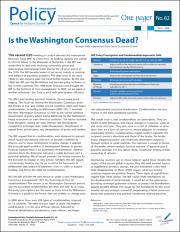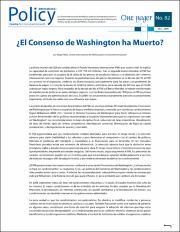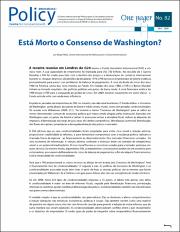Please use this identifier to cite or link to this item:
https://repositorio.ipea.gov.br/handle/11058/15463Files in This Item:
| File | Description | Size | Format | |
|---|---|---|---|---|
| en_IPCOnePager82.pdf | 59.81 kB | Adobe PDF |  View/Open | |
| es_IPCOnePager82.pdf | 300.98 kB | Adobe PDF |  View/Open | |
| pt-br_IPCOnePager82.pdf | 340.39 kB | Adobe PDF |  View/Open |
| Title: | Is the Washington Consensus Dead? |
| Other Titles: | ¿El Consenso de Washington ha Muerto? Está Morto o Consenso de Washington? |
| Authors: | Hailu, Degol |
| Abstract: | The recent G20 meeting in London elevated the International Monetary Fund (IMF) to a new level. Its lending capacity was tripled to US$750 billion. In the aftermath of World War II, the IMF was established to deal with declining commodity prices and deteriorating international trade. During the oil price shocks of the 1970s the IMF became lender of last resort, mainly to countries with balance of payments problems. The debt crisis of the early 1980s in Latin America gave the Fund further impetus. By the mid 1980s the IMF and the World Bank had become policy architects in low-income countries. The 1998 Asian financial crisis brought the IMF to the forefront of crisis management. In 2009, we are again at another milestone—the Fund is back with even greater influence. (...) A recente reunião em Londres do G20 elevou o Fundo Monetário Internacional (FMI) a um |
| metadata.dc.rights.holder: | International Policy Centre for Inclusive Growth United Nations Development Programme |
| metadata.dc.rights.license: | O texto e dados desta publicação podem ser reproduzidos desde que as fontes sejam citadas. Reproduções com fins comerciais são proibidas. |
| metadata.dc.type: | One Pager |
| Appears in Collections: | Publicações do IPC-IG |
Items in DSpace are protected by copyright, with all rights reserved, unless otherwise indicated.

